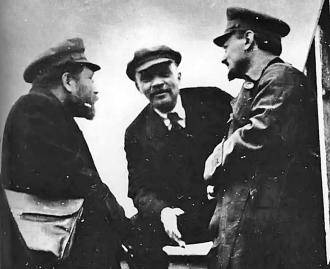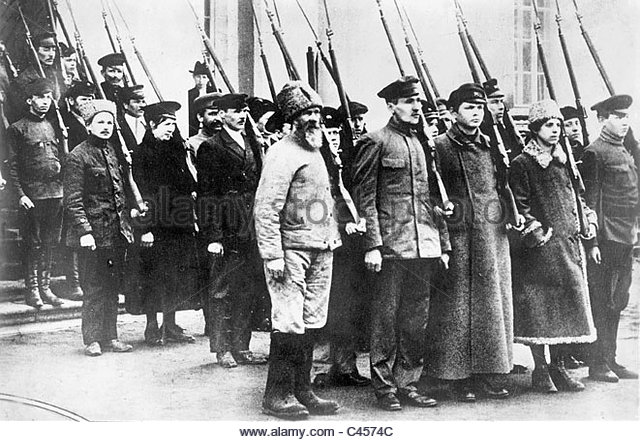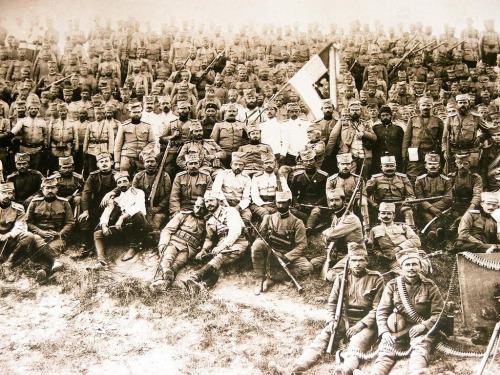Russian Revolutionaries Call for End to War
A New Nation Emerging from the Ashes.
Special to The Great War Project
(16 July) Outside the Western Front, there are many significant political and military developments a century ago in the first World War – in Russia, and in the Balkans.
It is in Russia, writes historian Martin Gilbert, “that the main threat lay to the Allied ability to make war, or to plan for a peace based on the conflict.”

Russian revolutionaries Leon Trotsky, right, and Vladimir Lenin, center.
On this day, July 16th a century ago, an uprising in Petrograd, the Russian capital, is led by Leon Trotsky, the communist revolutionary.
The demand, according to historian Gilbert, “an immediate end to the war.” Six-thousand sailors joined the revolt, and Trotsky believed it would lead to revolution.
It did not. Disturbances lasted for three days. In reaction, officer cadets loyal to the provisional government – and supporting the continuation of the war — attack the headquarters of Pravda, the communist newspaper. They smash the facilities to pieces.
These developments force Vladimir Lenin, the revolutionary leader, to go into hiding. Lenin is certain he is targeted for arrest or worse — assassination.
Russia is still fighting the war, but just barely. Its opponents have not succeeded — not yet – to force Russia to declare it is making a separate peace with Germany. That is the goal of the revolutionaries.

Volunteers led by Trotsky.
But as Gilbert reports, “the Russian military successes were coming to an abrupt end.” The Germans open up a twelve miles breach in the Russian line. In the process, the Germans take 6000 Russian troops prisoner.
“Thousands more fled from the battlefield,” Gilbert reports.
When news of this debacle reaches Petrograd, it forces the Prime Minister to resign. “The Russian advance had turned into a retreat, almost a rout,” writes Gilbert. “Tens of thousands of Russian soldiers simply threw down their rifles and fled from the war zone.”
Hundreds of officers are murdered.
Elsewhere, in the “little war” in the Balkans (where it all started), negotiations are taking place all through July a century ago on the island of Corfu in Greece a century ago. Present were representatives of several south Slav ethnic minorities, among them, Serbs, Croats, and Slovenes.
Their goal: to create a new nation carved out from some of the ethnically dominated territory that Austria-Hungary has lost in the war.

Many Serb units spent the war on the Greek island of Cortu.
More specifically a south Slav nation bringing together the three largest ethnic groups.
The meeting in Corfu is a success. It results in the Pact of Corfu. The pact calls for the formation of a government lead by the Serbian royal family with a constituent assembly elected by secret and universal suffrage.
“The idea of this new nation appealed in particular to the United States,” writes historian Gilbert “where there were many south Slav emigrant groups, and where the possible emergence of democratic, nationally cohesive systems on the ruins of an imperial structure is welcomed as an advance in human relations.”
The postwar world is beginning to take shape
